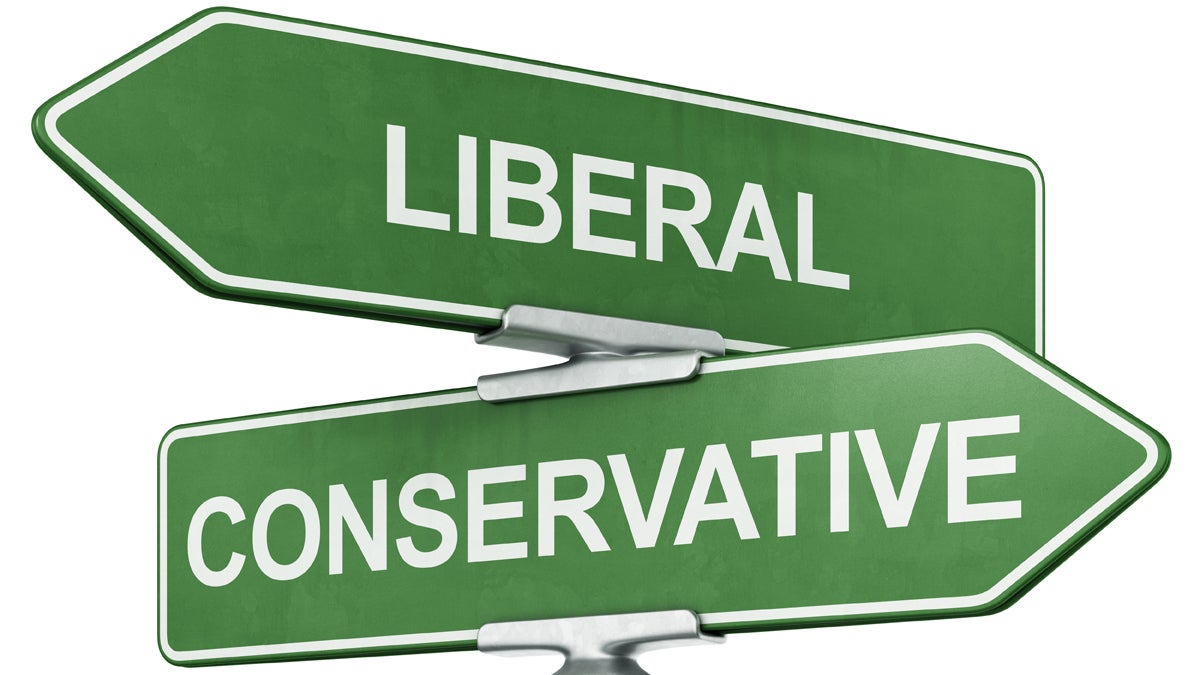Coming into conservatism progressively
Listen Liberal/conservative image courtesy of Shutterstock.com.) " title="liberal-conservative_1200x675a" width="1" height="1"/>
Liberal/conservative image courtesy of Shutterstock.com.) " title="liberal-conservative_1200x675a" width="1" height="1"/>
(Liberal/conservative image courtesy of Shutterstock.com.)
Developing a conservative point of view on this and other issues didn’t happen overnight. It occurred in me, if I may borrow a variation of a word from the other side, progressively.
The following is a work of opinion submitted by the author.
Civility in discussing political affiliation is still alive in at least one circle.
The amiable former journalist and aspiring novelist pegged me correctly as we chatted at the recent North Wildwood Beach Writers’ Conference. “I’m more on the liberal side,” he said after I mentioned that I wrote a book about the A-word from a newfound pro-life perspective.
Developing a conservative point of view on this and other issues didn’t happen overnight. It occurred in me, if I may borrow a variation of a word from the other side, progressively.
Rightward evolution
During my first decade as a voter in the 1970s, I leaned liberal. The Democrats claimed to care more about the middle to lower working class and the poor. I’m not sure why I believed them, since I’d adopted a cynicism about politics in general, and the Republicans in particular, thanks to the Watergate scandal. Maybe it was an emotional response to another current event. The second wave women’s movement was in full swing. What 20-something female did not want to be a part of a sisterhood demanding employment opportunities equal to those of men?
Marching to the women’s lib beat was just fine with me until I worked as a secretary for a disagreeable libber who was all about equal rights — hers and hers alone.
By the 1980s, more than few voices in the news reports that I avidly read irritated me. Some voices were condescending, especially those touting a woman’s right to choose. Others spoke in hostile undertones, especially in reference to politically active Christians. Although I was barely faith-based at the time, I found these snotty references to people of faith offensive.Increasingly, it seemed to me that liberals were not as open-minded as they proclaimed.
By the time I was in my 30s, I questioned the wisdom of those influential people who appeared to assume that they knew what was best for everybody, including me. I realized that my reservations were not unfounded after I acquired a taste for reading non-fiction in the 1990s.
Several books profoundly affected the formation my conservative political persuasion.
Required reading
In his groundbreaking book “The Culture of Disbelief: How American Law and Politics Trivialize Religious Devotion,” published in 1994, Yale Professor of Law Stephen L. Carter confirmed what I suspected about hostility toward religion in the United States. Carter described his examination of this issue as an effort “to figure out why it is that religion is seen as worse than other forces that mold people’s minds and to try to discover whether there might be a way to preserve the separation of church and state without trivializing faith as we do today.”
Emmy Award-winning journalist Bernard Goldberg’s gutsy book “Bias: A CBS Insider Exposes How the Media Distort the News,” published in 2002, made it clear to me that one-sidedness in the news was not a figment of my imagination. As Goldberg wrote, “The old argument that the networks and other ‘media elites’ have a liberal bias is so blatantly true that it’s hardly worth discussing anymore. No, we don’t sit around in dark corners and plan strategies on how we’re going to slant the news. We don’t have to. It comes naturally to most reporters.”
A third book, “Who Really Cares: The Surprising Truth About Compassionate Conservatism,” by scholar Arthur C. Brooks sealed the deal on conservatism for me. Brooks was a professor of business and government policy at Syracuse University when this book was published in 2006. He is now the president of the private, nonpartisan, non-profit American Enterprise Institute, a think tank dedicated to research and education on the issues of government, politics, economics and social welfare.
Segments from the summary of “Who Really Cares …” say it best about why this book affected me politically. It reads:
In his controversial study of America’s giving habits, Arthur C. Brooks shatters stereotypes about charity in America — including the myth that the political Left is more compassionate than the Right. Brooks … spent years researching giving trends in America, and even he was surprised by what he found. In Who Really Cares, he identifies the forces behind American charity: strong families, church attendance, earning one’s own income (as opposed to receiving welfare), and the belief that individuals-not government-offer the best solution to social ills.
Plus:
Brooks shows that giving is crucial to our economic prosperity, as well as to our happiness, health, and our ability to govern ourselves as a free people.
Authors Carter, Goldberg and Brooks unknowingly verified my conservatism. I wish there had been more time to tell my “more on the liberal side” writers’ conference acquaintance about their books.
—
Marybeth T. Hagan is the author of “Abortion: A Mother’s Plea for Maternity and the Unborn,” a Liguori/Triumph publication. Her commentaries and stories have been published by: The National Catholic Register, The Christian Science Monitor, The American Feminist, The Philadelphia Inquirer, Philadelphia Daily News, The [Philadelphia] Bulletin, The Philadelphia Tribune, The [Philadelphia] Catholic Standard & Times, The Delaware County Daily Times, Seven Mile Times [Avalon, N.J.], Sea Isle Times [Sea Isle City, N.J.].
WHYY is your source for fact-based, in-depth journalism and information. As a nonprofit organization, we rely on financial support from readers like you. Please give today.

